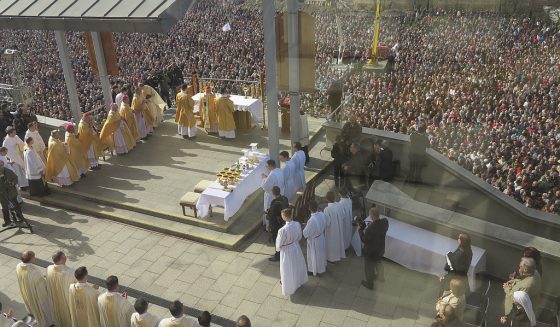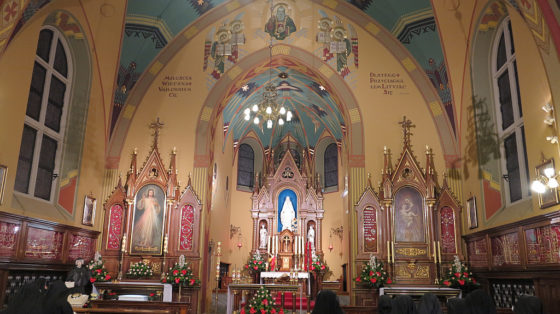The Feast of Mercy is celebrated on the first Sunday after Easter, that is on the Second Sunday of Easter, which is called the Divine Mercy Sunday today. Cardinal Franciszek Macharski was the first one to make it part of the liturgical calendar of the Archdiocese of Cracow (1985) and, later, some Polish bishops instituted the feast in their dioceses. In 1995, at the request of the Polish Episcopal Conference, Holy Father John Paul II instituted the feast in all dioceses in Poland. On the day of Sister Faustina’s canonization, 30th April 2000, the Pope instituted the feast for the whole Church.
The institution of the feast was inspired by a desire of Jesus which was conveyed by Sister Faustina. The Lord Jesus told her: “I want the first Sunday after Easter to be the Feast of Mercy” (Diary 299). “I want the Feast of Mercy to be a refuge and sanctuary for all souls, and especially for poor sinners. On that day the depths of My mercy are open; I pour out a whole sea of graces on souls that approach the fount of My mercy. Any soul that makes its Confession and receives Holy Communion will have its sins and its punishment completely remitted. On that day are open all the Divine floodgates through which graces flow” (Diary 699). In many revelations the Lord Jesus did not only define the place of the feast in the liturgical calendar of the Church but also the reason for its institution, the way it should be prepared, celebrated, and He also spoke about the great promises. The greatest of them is the grace of “complete forgiveness of sins and punishment”. It is connected with Holy Communion received on that day, following a good Confession (without any attachment to the smallest sin), in the spirit of the devotion to the Divine Mercy, that is, trusting God and loving neighbour actively. As the Rev. Professor Ignacy Różycki says, it is a grace greater than plenary indulgence. “Plenary indulgence is only a remission of temporal punishment for the sins committed, however, it is never a remission of the sins themselves. Basically, the most special grace is greater than the graces of the 6 sacraments, apart from the sacrament of baptism, since only the sacramental grace of the holy baptism is the forgiveness of all sins and punishment. However, as far as these promises are concerned, Christ associated the remission of sins and punishment with Holy Communion received during the Feast of Mercy, therefore, as regards this, He raised it to the rank of the ‘second baptism’.” In preparation for this feast we are to recite the novena which consists in saying the Chaplet to the Divine Mercy for 9 days. The novena begins on Good Friday. The Lord Jesus said to Sister Faustina: “Tell them that the Feast of Mercy has come from My depths for the consolation of the whole world” (Diary 1517).
The Feast of Mercy ranks highest among all the forms of the Divine Mercy devotion due to the greatness of the promises and due to its place in the liturgy of the Church. For the first time the Lord Jesus said that He desired that the Feast of Mercy be instituted while He was communicating His will regarding the painting of the Image. It was in Płock, in February, 1931. Then He told Sister Faustina: “I want a Feast of Mercy. I want the picture which you will paint with a brush blessed in a special ceremony on the first Sunday after Easter, that Sunday is to be the Feast of Mercy” (Diary 49). During the following years the Lord Jesus spoke about that matter again in a dozen or so revelations: then He did not only define the place of the feast in the liturgical calendar but He also said why it should be instituted, how it should be prepared and celebrated and He also spoke about the graces associated with the feast.
The choice of the first Sunday after Easter is not coincidental – this is the octave of the Lord’s Resurrection, which crowns the celebration of Christ’s Paschal Mystery. This period in the liturgy of the Church shows the mystery of the Divine Mercy, revealed most fully precisely in Christ’s passion, death and resurrection, more than the other periods. The institution of the Feast of Mercy in the ‘immediate vicinity’ of the liturgy of Christ’s passion and resurrection emphasizes the source of and motive for the mysteries of the faith. Certainly, this is God’s mercy. In other words – there would not have been the work of redemption had it not been for God’s Mercy. Sister Faustina saw this connection and she wrote in the ‘Diary’: “I see that the work of redemption is connected with the work of mercy which the Lord wants” (Diary 89).
What are the reasons for the institution of the new feast in the liturgical calendar of the Church? The Lord Jesus tells about them: “Souls are perishing despite My bitter Passion. I am giving them a last resort, the Feast of My Mercy. If they do not worship My mercy they shall perish forever” (Diary 965). Recourse to the Divine Mercy is the last hope. However, in order to take advantage of it, one should know that it exists, one should come to know God in the mystery of His mercy and turn with trust to Him – the institution of the separate feast helps one to come to know about that because it draws special attention to this attribute of God.
In preparation for this feast we are to recite the novena which consists in saying the Chaplet to the Divine Mercy for 9 days. The novena begins on Good Friday. The Lord Jesus promised: “Through this Novena, I shall grant all manner of graces to souls” (Diary 796). The novena to the Divine Mercy written down in Saint Faustina’s ‘Diary’ is also popular: each day we bring a different group of souls to God. Out of piety, we can make this novena, however, we should not confine ourselves to it, because the Lord Jesus desires that the feast be preceded by the novena consisting of the Chaplet to the Divine Mercy.
On the feast day (the first Sunday after Easter) the Image of the Merciful Jesus is to be solemnly blessed and publicly honoured; priests are to deliver sermons about the Divine Mercy and arouse trust in souls. The faithful should live the day with pure hearts, in the spirit of the devotion, which means, they should trust God and be merciful towards neighbour. “The first Sunday after Easter is the Feast of Mercy, but there must be deeds as well; I also require My mercy to be revered by the official celebration of this Feast and by reverence for the image” (Diary 742).
The Feast of Mercy is not only a day when great glory is given to God in the mystery of His mercy but it is also a day of tremendous grace because the Lord Jesus attached great promises to the feast. The greatest promise pertains to the grace of complete remission of sins and punishment (Diary 699). “Any soul that makes its Confession and receives Holy Communion will have its sins and its punishment completely remitted” (Diary 699). This grace – says Rev. Professor I. Różycki – “is much greater than plenary indulgence, which consists only in a remission of temporal punishment for the sins committed, however, it is never a remission of the sins themselves. Basically, the most special grace is greater than the graces of the 6 sacraments, apart from the sacrament of baptism: since only the sacramental grace of the holy baptism is the forgiveness of all sins and punishment. However, as far as the above-mentioned promises are concerned, Christ associated the remission of sins and punishment with Holy Communion received during the Feast of Mercy, therefore, as regards this, He raised it to the rank of the ‘second baptism’. It is clear that on the Feast of Mercy the Holy Communion must be not only received honourably but it should also meet the basic requirements of the devotion to the Mercy in order that it grants complete forgiveness of sins and punishment”. It should be explained that confession does not have to be made on the day of the Feast of Mercy, one make it earlier. What is important is that the soul should be pure, without attachment to any sin and what should also be mentioned is the solicitude for living this feast in the spirit of the devotion to the Divine Mercy, that is in the spirit of trusting God and being merciful towards neighbour. Only such an attitude enables us to expect that Christ’s promises attached to this form of the Divine Mercy devotion will be fulfilled.
The Lord Jesus said that “on that day are open all the Divine floodgates through which graces flow; let no soul fear to approach Me, even if its sins be as scarlet” (Diary 699). On that day all people, even those who did not have the devotion to the Divine Mercy earlier and who become converted only then, may partake in all the graces which the Lord Jesus had prepared for this feast. His promises pertain not only to all possible supernatural graces but also all possible rewards in this world. With trust people can ask for everything for themselves and others as long as that the subject-matter of the prayer is compatible with God’s will, that is, if it is good for man from the perspective of eternity. Graces necessary for salvation are always in accord with God’s will because what God desires most is the salvation of souls, for which Jesus gave His life. Therefore, on the Feast of Mercy all graces and rewards are available to all people and communities as long as they ask for them with trust.
Sr M. Elisabeth Siepak ISMM
Full theological analysis in:
Rev. Ignacy Różyczki: ‘The Devotion to the Divine Mercy‘
Cracow 2008, pp 99-104.
________________________
See also: Mercy » History of the Devotion to The Divine Mercy » Feast of Mercy
Plenary Indulgence for the Feast of Mercy
Translated by Iwona Franceschini\

















